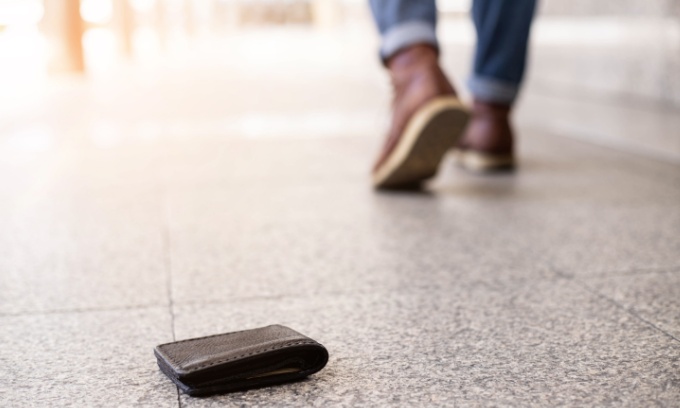KEY POINTS
- Most comprehensive travel insurance policies provide cover for the loss or theft of your personal items, including your wallet.
- You can utilise your travel insurance provider’s 24-hour helpline both if you’re feeling overwhelmed and to initial a claim.
- Reducing the amount of unnecessary items in your wallet may make replacing things easier, if you were to lose your wallet.
Losing your belongings while travelling overseas can be a very unpleasant experience, especially if you lose something important like your wallet. Fortunately, most comprehensive travel insurance policies provide cover for the loss or theft of luggage, passports and other items. Limits and sub-limits for claims will usually apply and can be found in a policy’s Product Disclosure Statement (PDS). It’s important to note that if your personal items were stolen or damaged due to being left unattended, your claim is likely to be rejected.
Besides being covered for lost luggage, travel insurance can also cover you if you become sick or injured abroad, which is why the Australian Government’s Smartraveller website describes having the right travel insurance policy as being as essential as taking your passport when travelling overseas.
So if you find yourself in an unfortunate situation, here’s what to do if you lose your wallet overseas.
What to do if you lose your wallet
If you’re feeling overwhelmed, especially if you’re in a non-English speaking country and you are not a native speaker, you may like to contact your travel insurance provider’s 24-hour helpline. They should be able to provide support, as well as talk you through this process.
Firstly, think about the last time you saw or used your wallet. Could it be missing or just misplaced? You can search your luggage, as well as places you’ve recently been to, but this may be difficult if you are in an unfamiliar country or under time constraints. If you are unable to locate it, follow the steps below:
Take an inventory
Think carefully about what was in your wallet, and make a list. Knowing what you’ve lost is important, as it can help when it comes time to cancel bank and identification cards, as well as file a travel insurance claim. If you intend to make a claim, it’s important to be as accurate as possible on what was lost with your wallet, as most travel insurance policies come with maximum and per item limits. If you are untruthful about what was lost, your claim may be denied.
Cancel all your cards
If your wallet has been lost or stolen, then so has all of the bank and identification cards inside it. Whether you had credit, debit, or travel cards or forms of identification like a drivers licence, you’ll most likely want to cancel them all ASAP. The person who stole your wallet (or one who finds it if it’s lost) can use your bank cards immediately if they have PayPass or PayWave capabilities, or could attempt to fraudulently use your forms of identification.
Usually you can either call or use your bank/financial institution’s app to lock your cards until you’ve confirmed that they have been lost or stolen. Once confirmed, you can cancel them in the same way. Your ID cards can be addressed when filing a police report and cancelled when you arrive back in Australia. Comprehensive travel insurance may help to cover the cost of replacing identifying documents, such as drivers licences and passports.
File a police report
In many countries, local police won’t be overly helpful to travellers who’ve been the victim of petty theft. It’s still worth finding the nearest police station and filing a police report. If your wallet is handed in to a police station, you’ve got no way of retrieving it if you haven’t filed a report with a description of the wallet and its contents. This is where you could also mention the forms of ID that you have lost, so that police are aware if someone tries to use them fraudulently.
Filing a police report is usually a requirement when making a travel insurance claim for lost or stolen items. Most policies require the report to be made within 24 hours of the incident or as soon as possible.
Call your travel insurance provider
Generally speaking, it can be a good idea to lodge your travel insurance claim as soon as possible, to avoid any complications or issues with your claim. Most policies will state that claims should be filed ‘promptly’ or ‘as soon as possible’. Your provider may also request additional supporting documents, which may be easier to obtain then and there, rather than after you have returned to Australia.
Review your bank accounts and credit score
After confirming that your wallet is lost, it can be important to keep an eye on your bank accounts to make sure fraudulent transactions aren’t being made. If you notice any fraudulent transactions, it’s often worth contacting your bank/financial institution immediately.
If you also lost identifying documents, it can be worth checking your credit score, to make sure fraudulent credit applications aren’t being taken out in your name. You can check your credit score for free with Canstar or via the Canstar App.
How to avoid losing your wallet
Petty crime is a global problem, so it can often be worth taking some precautions to secure your possessions, especially your wallet. While these measures won’t guarantee that you won’t lose your wallet, they can give you some peace of mind.
The placement of your wallet
Many people keep their wallet in their back pocket, which is the first place thieves look and is usually the easiest place to steal a wallet from. Consider keeping your wallet in your front or side pockets, in a pocket that can be secured with a button or zip or even in a secure part of your bag, on a money belt or a neck wallet. Money belts and neck wallets can sit comfortably and discreetly under your clothes.
Invest in a decoy
If you’re particularly worried about pickpockets at your travel destination, you could buy a second wallet. You could fill it with a small amount of cash and out-of-use and expired cards, but be wary of not contributing inadvertently to identification theft. Keep the decoy in your pocket and hide your real wallet in a more discreet place. In the unfortunate event that you are pickpocketed, or even mugged, you may lose the decoy wallet, but not anything important or valuable.
Be extra vigilant
In certain circumstances, such as in crowded public and tourist areas and on public transport, it’s best to stay alert regarding your wallet and possessions. Avoid pulling out your wallet in these places, or even fidgeting with it in your pocket. This can show prospective thieves where your wallet is.
Shorten straps and bag placement
If you have a purse or bag carried over your shoulder, you may also be at risk. Bags can potentially be snatched or have their straps cut. There have been instances overseas of bag straps being slashed by a motorcycle passenger during a drive-by theft. Shortening the straps and wearing your bag on the opposite side to the roadway may dissuade potential thieves. You could also consider wearing your bag or backpack on the front of your body, so that it’s in your sight.
Leave your wallet at your accommodation
If possible, you can leave your wallet at your accommodation if you’re only going out for a meal or for a singular or pre-booked activity. You may only need some cash, your travel or credit card or mobile phone with a digital wallet to help cover your bases. If you do decide to leave your wallet behind, you’ll want to ensure it’s left in a secure, lockable spot in your luggage or in the room’s safe (if it has one) so it can’t be stolen from your room. If your room doesn’t have a safe or your luggage doesn’t have a lock, then it might be a better option to take it with you.
Things you can do before you leave home
You can reduce the amount of unnecessary cards in your wallet, which means you’d have less things to replace in the event that you lose your wallet. It’s better to prioritise the cards that you’ll need for travel like travel cards, credit cards, driver’s licence (if you plan on hiring a car) or Medicare card (if you are travelling to a country with a reciprocal health care agreement with Australia). You may even be able to take virtual equivalents on your phone in a digital wallet.
Private health, transport and loyalty cards may have no use for you overseas, so they may be best left at home in a safe spot. If you carry sentimental things in your wallet, like photos of family, they may also be best left at home to avoid losing them, especially if you don’t have back up copies.
It can also be helpful to photocopy or make note of the contents in your wallet before you head overseas, keeping them on file should they need to be replaced. Writing out a list of all of the direct debits associated with the cards you are taking can also be important, as you may be charged late or missed payment fees on cancelled cards.
If you constantly find yourself losing or misplacing things at home and abroad, you may want to look into purchasing a wireless wallet and item tracker such as Tile or TrackR bravo. These devices link to your mobile phone and can send you updates of the tracker’s location. This can assist you in finding your lost items.
Cover image source: tpawat/Shutterstock.com








